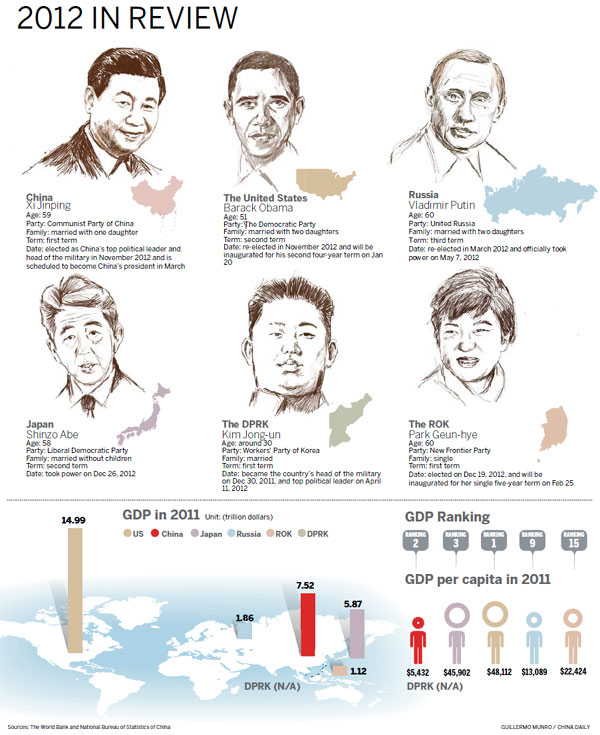New leaders hold key to Asia-Pacific ties
 0 Comment(s)
0 Comment(s) Print
Print E-mail China Daily, January 10, 2013
E-mail China Daily, January 10, 2013
A flurry of leadership changes in Asia-Pacific countries last year could shake up diplomacy in the region, presenting both a fresh chance to break deadlocks and the risk that regional tensions will continue to increase, experts said.
Most of the new leaders have signaled a readiness to repair ties that have been overshadowed by territorial and historic issues as well as the "pivot toward Asia" being pursued by external powers.
But it remains unclear whether the changes that will come about this year will be for the better, experts added.
Last year saw leadership changes in Russia, the United States, China, Japan and the Republic of Korea.
The essential place for diplomacy in 2013 will be Japan. It is the only one of those countries in which an opposition party took power last year and thus the only one in which sweeping changes are likely to be made to its foreign policy, said Qu Xing, president of the China Institute of International Studies.
Shinzo Abe, the new Japanese Prime Minister, has taken center stage. His country is now in a logjam over territorial disputes with three of its neighbors: China, the ROK and Russia. Abe's "scarily right-wing" stance now has Asia and the world on alert, according to the Economist.
"To describe the new government as 'conservative' hardly captures its true character," the Economist wrote in a recent article. "This is a cabinet of 'radical nationalists'."
Abe has made no secret of his wish to challenge post-war arrangements by taking steps such as rewriting Japan's pacifist constitution, increasing military spending, changing the name of the country's Self-Defense Forces to the national defense forces and replacing a 1995 apology for suffering Japan caused in Asia during World War II with an unspecified "forward-looking statement".
Yet, despite his tough talk, Abe may take a more pragmatic approach to improving Japan's disheartening relations with its neighbors, said Wang Junsheng, a researcher in East Asian studies at the Chinese Academy of Social Sciences.
The BBC recently reported that in 2007, during his first term as prime minister, Abe had worked to repair Japan's tattered relations with China, and it said he may try to do so again.
Abe's Democratic Party of Japan will probably also have an easier time trying to mend fences with China. The party, in its more than half a century in power, has had time to develop sound communication channels and contacts with China, said Zhou Weihong, a Japan specialist at Beijing Foreign Studies University, according to Agence France-Presse.
Shi Yinhong, an expert on international politics at Renmin University of China, said Abe has positioned China as "Tokyo's top target in Asia", making it difficult for the countries to take anything but a confrontational stance toward each other.
Tokyo's relations with Beijing soured in September after it illegally "purchased" the Diaoyu Islands, which have belonged to China for centuries. Meanwhile, the Abe administration is working with the ROK and Southeast Asia to encircle China.
Japanese Foreign Minister Fumio Kishida is scheduled to start on a trip to the Philippines, Singapore, Brunei and Australia on Wednesday, and Abe himself is scheduled to make his first trips abroad as prime minister by traveling to Vietnam, Thailand and Indonesia.
Some of these countries have competing claims with China over parts of the South China Sea.







Go to Forum >>0 Comment(s)